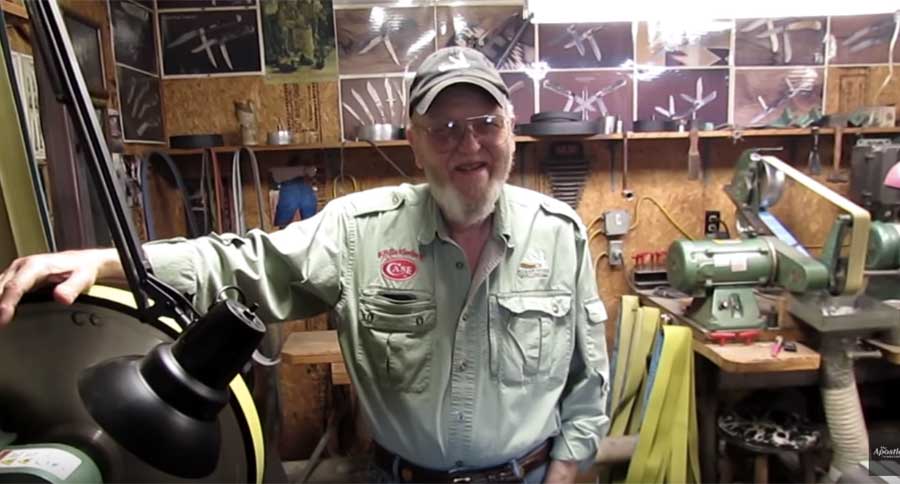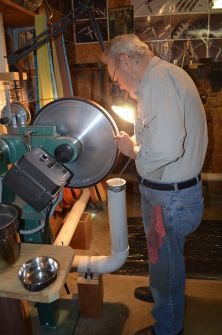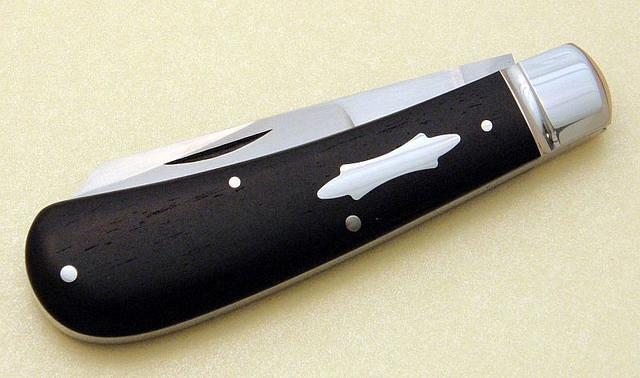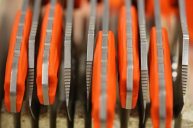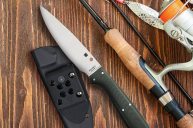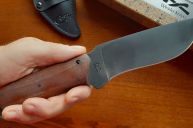Tony Bose shows us what it takes to be a world-renowned craftsman.
Tony Bose is a master cutler of traditional folding knives. Working out of a custom shop in Shelburn, IN, and he also lends his expertise to the 128-year-old knife company Case Knives, providing designs and oversight. At SHOT Show 2017, I had the pleasure of meeting Tony for an interview about his passion for knives, his teamwork with his son and fellow knife maker, Reese Bose, and his taste in country music!
I'd love to hear your story. How did you get into designing knives?
I've always been knife crazy, since I was a little kid. I used to repair them, and I became of the opinion that if I could fix one, I could make one. Well, I found out it was a lot harder than that. But I'm self-taught, so I was making knives for about 10 years before I ever saw another handmade knife. It's just something I had to do.
I don't do it for the money, I do it for the passion. I mean, the money's nice, you know what I mean — but even if there was no money I'd still be doing it. Anybody that's well known for anything was doing it for years and years before anybody ever heard of them, and they did it for the passion, and always trying to do it better. I mean, I still can't make a knife I'm happy with.
Really?
Yes. I still think I could do it better, and I've been doing this for 45 years. I still learn things, and I still think I can do better. That's what keeps me going.
Can you tell me something you learned recently, maybe, something you didn't know earlier in your career?
Well, I've learned to make lockbacks. I never did make very many lockbacks, but I've learned how to machine that lock in. So, I've made a few lockbacks in traditional patterns.
When I make something new, I think about it for a long time. I put some thought into it, and I know whether I can do it or not. I don't jump into it blind. I've heard there's some people that can see things in 3D, and I'm one of them. I can see it working; I can see it from both sides, and when I start it I know I can do it.
I also tell younger guys: if you get bored, just start adding blades. It really complicates it. It's like the Richter scale, you know? An earthquake at 7 isn't just more than 6. It's a lot more. That's how it is with knife blades.
What's your process is like? How do you get started on a knife, and where do you go from there?
Well, what I do is I resurrect old patterns. Things you used to be able to buy at the hardware store 100 years ago and you can't find now. That's a lot of what I do with Case. I do design some new things, too — like the Tribal Spear we did, or the Wharncliffe Trapper, I do some things that haven't been done before. But I want to make them useful, and I make every one of them to be used.
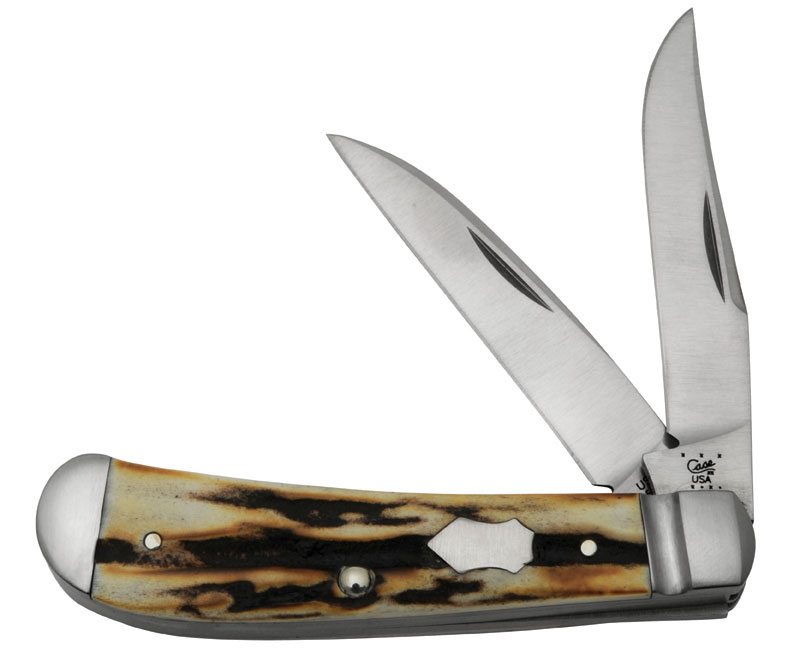
Wharncliffe Trapper via
W.R. Case
I've studied antique knives all my life, I used to run the National Knife Collectors Association (NKCA) shows, and those dealers would let me behind the table (they always hide the good stuff under the table). I got to see things that ordinary people didn't get to see. Those guys knew a lot, and I was smart enough to shut up and listen to them. I learned a lot that way.
Some of these patterns have a certain look, and if you deviate from that, it just doesn't look right. So what I try to do is stay true to tradition — you can't make them any better than that — you can make them out of better materials and fine tune them, that's about it.
And, the way I see it, if it ain't gonna work for me, it ain't gonna work for the American public. I won't make an ugly knife — I won't make a clunker, you know what I mean? It'll be pretty nice or I ain't gonna make it!
As far as modern knives, I don't have a use for them: they usually have too wide a blade, and I can't remember the last time I had to kill a guy. And I have time to open my pocket knife.
Now, I don't have anything against anyone who wants to make that type of knife. They're just not for me. Traditional knives have been made for 200 years or more, and they're time-proven patterns. They're a working tool.
You said it right there. A lot of our readers are hunters, you know, and they don't fall for the gimmicks.
I do make a couple hunting knives; I know some guys in the swamps of Louisiana, and they hunt a lot and fish a lot, and they use them a lot. I make knives for them because they use them a lot: they're high performance, made out of high-performance steel, and they're ground right and heat-treated right.

Folding Hunter via
Bose Knives
Working with Case, they pretty much let you do whatever you want to do? They go along with your inspiration?
Pretty well. If we decide we want to do something, they turn me loose on it. What I do when they make them is I make one that is entirely finished for quality control, then I make one just like it that's just got the pins sticking out so you can take it apart. But it's all tuned up, everything's flush, everything works, and they take that apart and they make programs for all the pieces. They make a wire cut that's accurate up to one ten-thousandth of an inch, so what they put out is pretty accurate.
If I make the knife, it's $2,500, but the Case knife goes for something like $350, so people can afford it — people can get a piece of me for a fraction of the price. They're not as good for finish and everything, but they're almost as good.
You mentioned to me earlier that you like ebony handles. Why's that?
Ebony's my favorite type of wood. You know, they buried logs of ebony with the Pharaohs when they buried them? It was a very highly thought of wood.
No, I didn't know that!
They did. It's very stable, it's got a lot of oil in it and doesn't need a finish. It's a hard, dense wood. And the more you handle it, the blacker it gets. I just like it. Sometimes something just appeals to you.
How about some personal history? What were you like growing up?
You know, I grew up in a rough neighborhood. I lost my right eye in that neighborhood. When I got older, I just wanted to make a living — but having lost my right eye, I wasn't like everybody else. In the 1960s, when I got out of High School and I was looking for a job, they'd say, "Oh, we don't hire one-eyed people." In the '70s, they just wouldn't hire me.
Then, I think started doing this in 1972. I always had my shoulder down and my chin up, with a goal of someday making a living at it. I went full time in 1989, and it was the best thing that ever happened to me.
You seem like a little bit of a lone gunman. Do you ever work with other people?
Well, my son. I taught my son how to do this. He's as good as anybody in the world at making these things. And I help everybody I can help in this business. I answer any questions, and I hold nothing back, because if somebody had helped me, my life would have been a lot easier. Back when I was starting, there weren't even any books on the subject, there wasn't anybody to talk to. I figured everything out by screwing it up and figuring out how not to screw it up.
So, I've sent my patterns all over the world. One time, back in the day, I asked a maker if he'd give me a pattern for a knife and he said no, and that hurt. So I thought, if anybody ever asks me, I'm going to do it, and I do. I've never turned anybody down, ever.
I want traditional knives to live on because they're a useful tool. You know, Case has been at this for 100 years, when a lot of the other knife companies have gone out of business — but there are new companies now that are doing it, and that makes me really happy. I want it to live on.
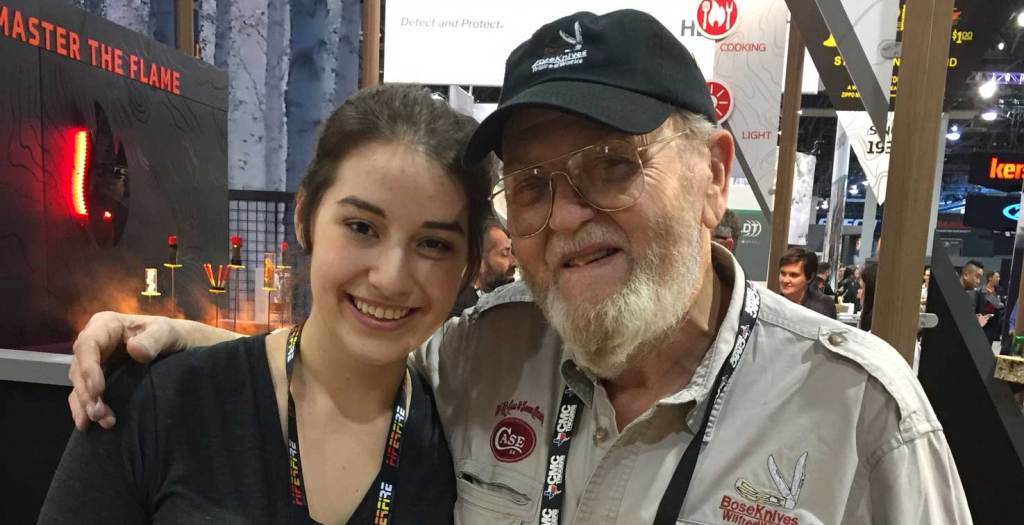
Hanging out with Tony Bose, SHOT Show 2017
A little off the beaten path: when you're working, do you ever play any music?
Oh, sure. I'm a Country guy, and a Rock 'n' Roll guy, a little Delta Blues. I like a lot of them out of the '60s. Out of the '70s I like Credence, I like the Eagles, but I really started liking country music in '68 when rock went psychedelic. I like the old country singers, George Jones and Conway Twitty. They weren't stud muffins like they are today. Everybody's gotta wear tight blue jeans today.
I have one more question for you, and it's one I'm sure you get all the time. What makes a craftsman?
What makes a craftsman? Someone who is his own worst critic.
If you enjoyed this interview, please watch "Handcrafted America" on February 3 to see Tony Bose on TV!
NEXT: HERE'S A GREAT RUNDOWN ON THE BEST EVERYDAY CARRY BELTS
